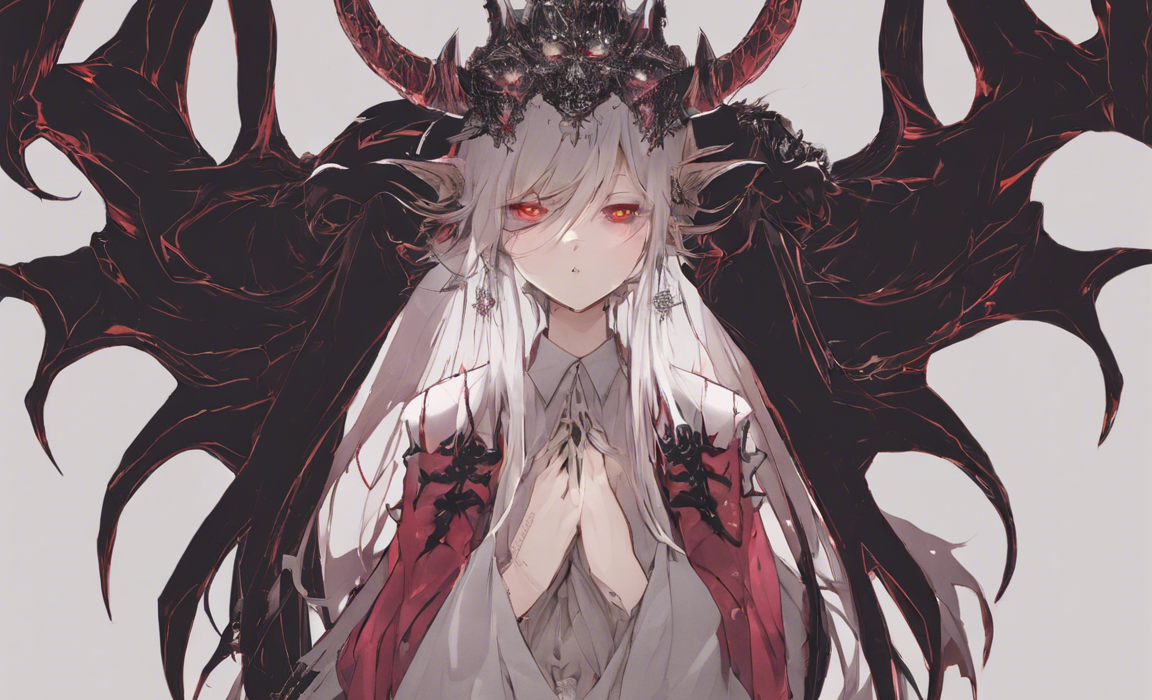In the vast realm of fantasy literature, tales of love between humans and otherworldly beings have captured the imagination of readers for centuries. From mythical creatures like vampires and werewolves to ethereal beings such as faeries and angels, the juxtaposition of the ordinary and the extraordinary in these romances serves as a powerful metaphor for the complexities of love itself. One particularly intriguing and often overlooked archetype in this genre is the Demon Queen Wife.
The Enigmatic Demon Queen Wife: Unraveling the Mystery
In the annals of fantasy literature, the Demon Queen Wife is a character shrouded in enigma and allure. Often portrayed as a powerful and seductive entity, she embodies the dual nature of darkness and light, chaos and order. Her very existence challenges societal norms and defies expectations, making her a captivating figure for readers seeking stories that push the boundaries of conventional romance tropes.
The Allure of Forbidden Love
At the heart of the Demon Queen Wife narrative lies the theme of forbidden love. The taboo nature of the relationship between a mortal protagonist and a demon queen adds a layer of tension and danger to the story. The allure of forbidden love is a timeless motif in literature, speaking to the primal desire for the unknown and the forbidden.
Power Dynamics and Feminine Strength
Central to the character of the Demon Queen Wife is her innate power and agency. Unlike traditional female characters who may be relegated to secondary roles, the demon queen exudes strength and independence. Her allure lies not only in her physical beauty but also in her formidable magical abilities and cunning intellect. The power dynamics between the mortal protagonist and the demon queen add depth to their relationship, challenging traditional notions of gender roles and authority.
Navigating Moral Ambiguity
One of the most compelling aspects of the Demon Queen Wife narrative is the exploration of moral ambiguity. As a denizen of the underworld, the demon queen may possess a dark past or engage in morally questionable actions. However, her love for the mortal protagonist humanizes her character, blurring the lines between good and evil. This moral ambiguity adds complexity to the story and forces readers to confront their own preconceptions about right and wrong.
The Evolution of the Demon Queen Wife Trope
While the archetype of the Demon Queen Wife has roots in ancient folklore and mythology, it has evolved over time to reflect changing societal attitudes towards gender, power, and love. Modern interpretations of the trope often subvert traditional fairy tale narratives, offering more nuanced portrayals of female characters and their relationships with mortal partners.
Empowerment and Agency
In contemporary fantasy literature, the Demon Queen Wife is often depicted as a symbol of female empowerment and agency. Rather than being defined solely by her relationship with the male protagonist, she is portrayed as a multifaceted individual with her own goals and desires. This shift towards more complex and independent female characters reflects a broader cultural movement towards gender equality and representation in media.
Romanticizing Otherness
The Demon Queen Wife trope also reflects a growing fascination with the “other” in popular culture. By romanticizing the relationship between a mortal and a supernatural being, authors explore themes of diversity, acceptance, and the beauty of difference. The demon queen, with her otherworldly allure and mysterious origins, represents a departure from the ordinary and challenges readers to embrace the unknown.
Frequently Asked Questions (FAQs)
1. What distinguishes the Demon Queen Wife trope from other supernatural romance archetypes?
The Demon Queen Wife trope typically features a powerful female supernatural being, such as a demon or sorceress, as the love interest. This character is often depicted as morally ambiguous and challenges conventional gender roles and power dynamics.
2. Are there any notable examples of the Demon Queen Wife trope in literature and popular culture?
Yes, there are several examples of the Demon Queen Wife trope in various media. One prominent example is Lilith, a figure from Jewish folklore who has been reimagined in contemporary fantasy literature as a demon queen and seductress.
3. What themes are commonly explored in Demon Queen Wife narratives?
Themes of forbidden love, power dynamics, moral ambiguity, and the empowerment of female characters are often central to Demon Queen Wife narratives. These themes add depth and complexity to the romantic relationship between the mortal protagonist and the supernatural being.
4. How has the portrayal of the Demon Queen Wife trope evolved over time?
The portrayal of the Demon Queen Wife trope has evolved to reflect changing societal attitudes towards gender, power, and romance. Modern interpretations of the trope often emphasize female empowerment, agency, and the celebration of diversity and otherness.
5. What is the appeal of the Demon Queen Wife trope for readers of fantasy literature?
The Demon Queen Wife trope offers readers a compelling blend of romance, danger, and intrigue. The forbidden nature of the relationship, as well as the exploration of power dynamics and moral ambiguity, make these narratives captivating and thought-provoking for fans of the fantasy genre.
In conclusion, the Demon Queen Wife trope in fantasy literature offers a rich tapestry of themes and narratives that explore the complexities of love, power, and identity. By subverting traditional gender roles, challenging moral norms, and celebrating the allure of the supernatural, these stories push the boundaries of conventional romance tropes and invite readers to delve into the realm of the mysterious and the forbidden.


